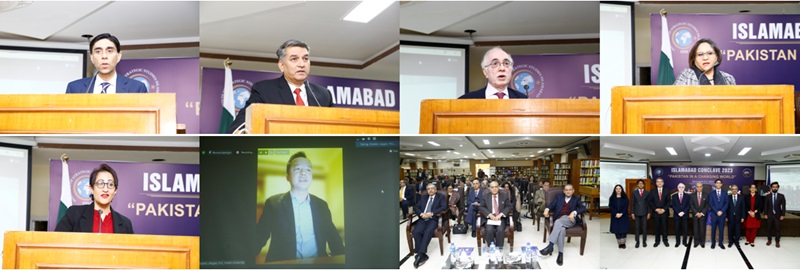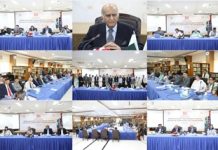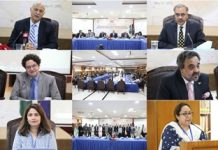Islamabad Conclave-2023
“Pakistan in a Changing World”
December 6-7, 2023
Press Release
Working Session Three “Navigating Complex Geopolitics:
Accentuating Pivot to Geo-economics”

The third working session, titled, Navigating Complex Geopolitics: Accentuating Pivot to Geo-economics was moderated by Dr. Talat Shabbir, Director CPSC. The keynote address was delivered by Dr. Moeed Yusuf, Vice Chancellor, Beaconhouse National University (BNU) Lahore. The speakers included, Ambassador Masood Khalid, Former Ambassador to China, Ambassador Naghmana Hashmi, Former Ambassador of Pakistan to China, Prof. Dr. Zhang Jiegen, Fudan University and Dr. Rabia Akhtar, Dean Faculty of Social Sciences, and Director, CSSPR, University of Lahore.
Dr. Talat Shabbir, Director CPSC in his opening remarks said that the evolving international landscape has put nations on the crossroads of shaping their foreign policies in light of complex regional and global paradigm. Pakistan is embarking on a transformative journey of pivoting towards geo-economics in order to leverage economic potential as a means of advancing national interests.
Dr Moeed Yusuf while delivering his keynote address on Navigating Complex Geopolitics: Accentuating Pivot to Geo-economics was of the view that success of any consensual framework depends on implementation but we are still debating on how to move forward. He stated that the real question regarding geo-economics is on how to move forward. He noted that there is a misconception of what ‘geo-economics’ is as far as Pakistan is concerned. Geo-economics post-cold war became a Machiavellian concept in western world. However, Pakistan adopted a “cooperative geo-economics” framework. For economic security you have to identify what things you will do in the economic sphere that will benefit your overall economy by ensuring the negatives are curtailed. Summing up, he said, that we should debate the solutions and problems through geo-economics framework to start working towards our key goals rather than debating it is good or bad.
Ambassador Masood Khalid, while speaking on Decade of CPEC, said that the Belt and Road Initiative (BRI) is the reincarnation of Chinese philosophical approach of win-win cooperation and peaceful coexistence. Through BRI, China is helping other economies as well as other economies. CPEC is aligned with China’s neighbourhood policy. Neighbourhood is where China survives and thrives and the foundation of its stability, development and prosperity.
Ambassador Naghmana Hashmi spoke on Parameters of Soft Connectivity and Tourism, and the role of CPEC in promoting soft connectivity. CPEC is an enabler for promoting internal connectivity, she said. Pakistan should adopt a clear tourism policy that provides the sector a status of industry and tax holidays should be given to promote the sector. She concluded that the CPEC has indeed improved things, it can continue to improve things, however we have to give importance to sectoral development and adopt clear policies.
Speaking virtually from China, Dr. Zhang Jiegen of Fudan University stated that if we look back at history, Pakistan has adopted the right approach towards geo-economics which had been adopted by China as well during 1970s and early 1980s. The first important point for achieving such a vision for geo-economics is national consensus. The National Security Policy document reflected that all national leaders agreed to this new concept of geo-economics. The policy is an evolving document, and it helps build consensus within the country.
Dr. Rabia Akhtar spoke on operationalizing pivot to geo-economics outlining essential pre-requisites that include most importantly political stability in the country, followed by rule of law, controlling corruption, macroeconomic stability, diversification of economy promoting public private partnerships and promoting social security. In order to achieve this, we need to collectively acknowledge what needs to be done and then do the needful.
The session was followed by a Q&A session. Towards the end of the session, Chairman BoG ISSI Ambassador Khalid Mahmood presented ISSI’s memento to the esteemed panellists.
Besides the distinguished speakers from Pakistan and abroad, the session was attended by a large number of scholars, academics, researchers, practitioners, students, members of the diplomatic corps, and representatives of the media.











